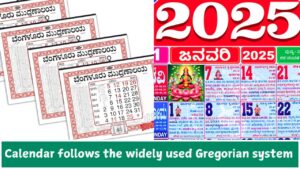2025 Calendar follows the widely used Gregorian system
The 2025 calendar follows the widely used Gregorian system, consisting of 365 days divided into 12 months and 52 weeks. The year begins on Wednesday, January 1, and concludes on Wednesday, December 31. As 2025 is not a leap year, February has 28 days. This summary covers key details about the structure of the calendar, global and cultural holidays, astronomical events, and its practical applications.

1. Structure of the 2025 Calendar
The Gregorian calendar, introduced by Pope Gregory XIII in 1582, is the most commonly used system today. It is solar-based and designed to align with Earth’s revolution around the Sun.
- Total Days: 365
- Leap Year: 2025 is not a leap year.
- Start and End: Begins on Wednesday and ends on Wednesday.
Each month has the following number of days:
- January, March, May, July, August, October, and December: 31 days.
- April, June, September, and November: 30 days.
- February: 28 days.
2. Monthly Highlights and Notable Dates
The year includes many global and cultural events spread across its months:
- January: Starts with New Year’s Day on Wednesday, January 1.
- February: Valentine’s Day falls on Friday, February 14.
- March: Holi, the festival of colors, is celebrated on Friday, March 14.
- April: Easter Sunday is observed on Sunday, April 20.
- May: Labor Day is on Thursday, May 1.
- June: The Summer Solstice, the longest day of the year, occurs on Saturday, June 21.
- July: The USA celebrates Independence Day on Friday, July 4.
- August: Raksha Bandhan, a festival symbolizing sibling bonds, falls on Saturday, August 9.
- September: Ganesh Chaturthi is celebrated on Sunday, September 7.
- October: Dussehra, a major Hindu festival, is observed on Friday, October 3.
- November: Diwali, the festival of lights, falls on Saturday, November 1.
- December: Christmas is celebrated globally on Thursday, December 25.
3. Global and Cultural Holidays
2025 is packed with holidays of religious, cultural, and historical significance:
- New Year’s Day (January 1): Celebrated worldwide as the start of the new year.
- Easter (April 20): A key Christian holiday marking the resurrection of Jesus Christ.
- Independence Days: Countries like the USA (July 4) and India (August 15) commemorate their freedom.
- Religious Festivals: Diwali, Eid al-Fitr, Hanukkah, and Christmas are widely observed.
- Labor Day (May 1): A tribute to workers and labor movements.
These holidays offer opportunities for family gatherings, celebrations, and cultural appreciation.
4. Astronomical Events in 2025
The year also features significant celestial phenomena for astronomy enthusiasts:
- Lunar Eclipses: Two eclipses will occur, including one total eclipse visible from many regions.
- Solar Eclipse: An annular solar eclipse is expected on October 2, 2025, where the Sun will appear as a “ring of fire.”
- Meteor Showers: The Perseid meteor shower peaks in August, and the Geminids light up December skies.
Astronomical events such as the Summer Solstice (June 21) and Winter Solstice (December 21) are also notable for their cultural and scientific importance.
5. Calendars Across Cultures
While the Gregorian calendar is globally dominant, many cultures use alternative or supplementary calendars:
- Indian Panchang: Combines lunar and solar cycles, essential for Hindu festivals.
- Hijri Calendar: The Islamic calendar follows lunar phases, and 2025 corresponds to the years 1446–1447 AH.
- Chinese Calendar: Based on lunar-solar cycles, 2025 marks the Year of the Snake, starting January 29.
These calendars serve cultural, religious, and agricultural purposes, enriching the diversity of timekeeping practices.
6. Importance of Calendars
Calendars are essential for various aspects of life:
- Religious Observances: Holy days like Christmas, Ramadan, and Diwali depend on precise dates.
- Agricultural Planning: Farmers use calendars to track seasons and harvests.
- Economic Scheduling: Fiscal quarters and tax deadlines rely on calendar dates.
- Time Management: Personal and professional events are organized using calendars.
In today’s digital age, calendars also sync seamlessly with apps and devices, enhancing efficiency and accessibility.
7. Digital Calendars and Tools
Modern technology has revolutionized calendar use. Popular apps like Google Calendar, Apple Calendar, and Outlook offer features like:
- Event reminders and task scheduling.
- Integration with email and productivity tools.
- Customization with themes, color-coding, and local holiday sync.
These tools are invaluable for organizing personal, professional, and social life.
8. The Calendar Printing Industry
Despite digital advancements, physical calendars remain popular.
- Personalized Calendars: Include family photos or custom art for a personal touch.
- Corporate Calendars: Businesses distribute branded calendars for promotional purposes.
Calendars also hold cultural and aesthetic value, serving as decorative items in homes and offices.
9. Practical Tips for Using the 2025 Calendar
- Plan Ahead: Schedule important tasks and holidays early.
- Set Goals: Divide yearly objectives into monthly and weekly milestones.
- Sync Devices: Use digital tools to avoid overlapping events.
- Highlight Holidays: Mark long weekends for vacations or family gatherings.
Efficient calendar use improves productivity and ensures a balanced lifestyle.
10. Fun Facts About Calendars
- The word “calendar” originates from the Latin “calendae,” meaning the first day of the month.
- Ancient Egyptians were among the first to create a solar-based calendar.
- The seven-day week derives from ancient planetary associations.
In summary, the 2025 calendar is more than just a tool for timekeeping; it serves as a framework for cultural traditions, global events, and personal planning. Whether using printed versions or digital platforms, mastering the calendar can enrich your year and help you stay organized.
